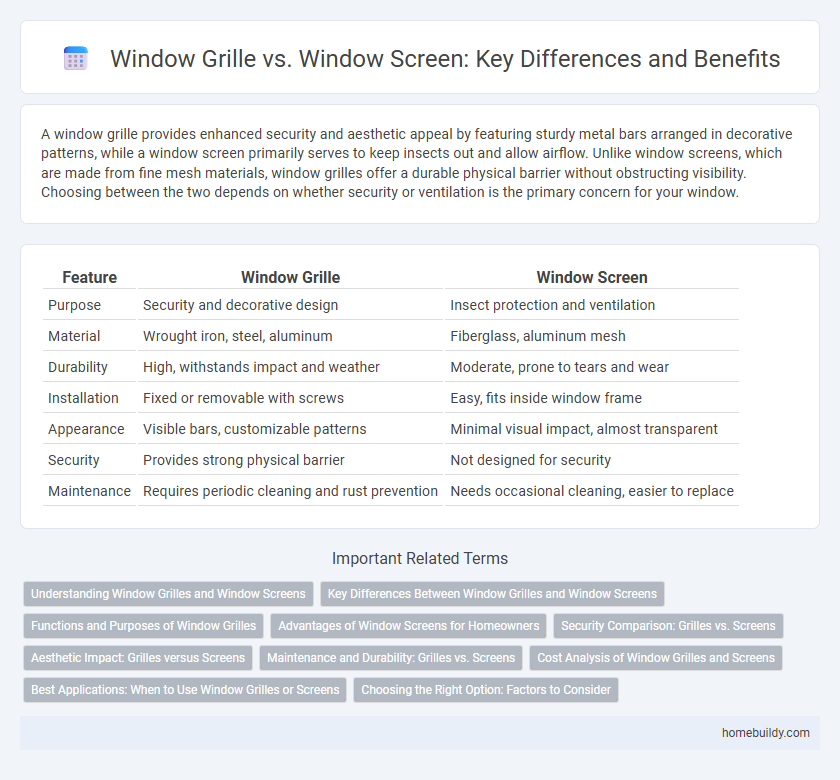A window grille provides enhanced security and aesthetic appeal by featuring sturdy metal bars arranged in decorative patterns, while a window screen primarily serves to keep insects out and allow airflow. Unlike window screens, which are made from fine mesh materials, window grilles offer a durable physical barrier without obstructing visibility. Choosing between the two depends on whether security or ventilation is the primary concern for your window.
Table of Comparison
| Feature | Window Grille | Window Screen |
|---|---|---|
| Purpose | Security and decorative design | Insect protection and ventilation |
| Material | Wrought iron, steel, aluminum | Fiberglass, aluminum mesh |
| Durability | High, withstands impact and weather | Moderate, prone to tears and wear |
| Installation | Fixed or removable with screws | Easy, fits inside window frame |
| Appearance | Visible bars, customizable patterns | Minimal visual impact, almost transparent |
| Security | Provides strong physical barrier | Not designed for security |
| Maintenance | Requires periodic cleaning and rust prevention | Needs occasional cleaning, easier to replace |
Understanding Window Grilles and Window Screens
Window grilles are decorative or security bars installed on windows to enhance aesthetic appeal and provide protection, while window screens serve primarily as a mesh barrier to keep insects and debris out while allowing airflow. Grilles are typically made from materials such as metal or wood and can be fixed or removable, offering structural reinforcement. Screens use fine mesh, often fiberglass or aluminum, designed to preserve visibility and ventilation without compromising security.
Key Differences Between Window Grilles and Window Screens
Window grilles are metal or wooden bars installed on window frames primarily for security and decorative purposes, while window screens are mesh panels designed to keep insects out and allow airflow. Grilles offer physical protection and aesthetic enhancement, whereas screens prioritize ventilation and pest prevention. The key difference lies in their functionality: grilles provide safety and style, whereas screens focus on comfort and insect control.
Functions and Purposes of Window Grilles
Window grilles serve primarily as a decorative and security feature, enhancing the aesthetic appeal of windows while providing a physical barrier against intruders. Unlike window screens that focus on ventilation and insect control, window grilles add structural reinforcement to windows and can be customized with various patterns and materials such as wrought iron or aluminum. Their functions extend to supporting glass panes and increasing privacy without obstructing natural light.
Advantages of Window Screens for Homeowners
Window screens offer superior ventilation and insect protection compared to window grilles, allowing homeowners to enjoy fresh air without the risk of pests entering the home. These screens are typically easier to install and remove, providing flexible options for cleaning and seasonal changes. Their lightweight design enhances energy efficiency by promoting airflow while maintaining visibility and outdoor views.
Security Comparison: Grilles vs. Screens
Window grilles offer superior security compared to window screens due to their robust metal construction, which effectively prevents unauthorized entry and withstands forced break-ins. In contrast, window screens primarily serve as barriers against insects and debris but provide minimal protection against intruders. The strength and durability of window grilles make them a preferred choice for enhancing home security.
Aesthetic Impact: Grilles versus Screens
Window grilles enhance the aesthetic appeal of a building by adding architectural character and intricate design patterns that complement various styles, from traditional to modern. In contrast, window screens primarily serve a functional purpose, offering insect protection and ventilation with minimal visual impact, often blending subtly into the window frame. The choice between grilles and screens significantly affects the exterior and interior ambiance, with grilles providing a decorative focal point while screens maintain unobstructed views.
Maintenance and Durability: Grilles vs. Screens
Window grilles require less frequent replacement compared to window screens, as they are typically made from sturdy materials like wrought iron, aluminum, or steel that resist weather damage and corrosion. Window screens, often constructed from fiberglass or aluminum mesh, are more prone to tears, rust, and wear, necessitating regular maintenance and periodic replacement. The durable construction of window grilles ensures long-term protection and minimal upkeep, making them a more cost-effective option over time.
Cost Analysis of Window Grilles and Screens
Window grilles generally have a higher upfront cost than window screens due to the use of durable materials like iron or steel and the complexity of installation. Window screens, typically made from lightweight mesh materials such as fiberglass or aluminum, offer a more affordable option with lower installation expenses. Over time, window grilles may provide increased security value, potentially reducing long-term costs related to home safety, while screens primarily focus on insect protection and ventilation.
Best Applications: When to Use Window Grilles or Screens
Window grilles provide enhanced security and architectural appeal, making them ideal for homes in high-crime areas or those seeking classic design elements. Window screens are best suited for ventilation and insect prevention, essential in regions with warm climates and abundant outdoor bugs. Choosing between window grilles and screens depends on whether the primary need is protection or airflow management.
Choosing the Right Option: Factors to Consider
When choosing between a window grille and a window screen, security needs and ventilation preferences are key factors to consider. Window grilles provide robust protection against intrusions and add a decorative element, while window screens primarily prevent insects and debris from entering without obstructing airflow. Assessing the balance between safety requirements and air circulation will help determine the most suitable option for your home.
Window grille vs Window screen Infographic

 homebuildy.com
homebuildy.com